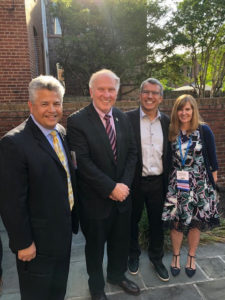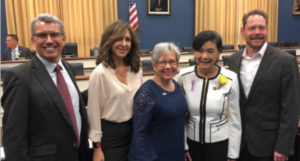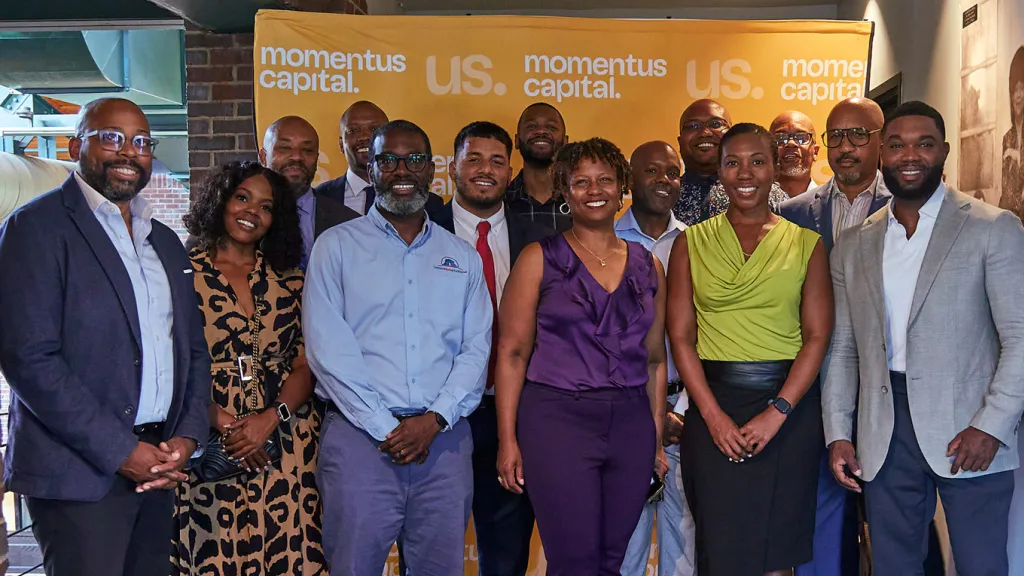CDC Small Business Finance leadership met with congressional members in May to continue sharing the widespread impact of two U.S. Small Business Administration loan programs in underserved business communities: SBA 504 and SBA Community Advantage.
The annual advocacy trip to Washington D.C. again lined up with the Spring Summit put on by advocacy group National Association of Development Companies, or NADCO. This long-running event marks an ideal time to get face-to-face time with elected officials on both sides of the aisle and fellow mission-based lenders to share successes and advocate for important causes. In fact, for many years, CDC has made the important trek to the Hill to do that just that.
“Small business is a bipartisan issue,” said CDC President and CEO Kurt Chilcott. “Meeting with elected officials is an important part of the work we do as a community lender. We’re grateful to the SBA and their products that we are able to increase access to capital to underserved business owners.”
CDC’s executive leadership team – including Chilcott, Mike Owen, Robert Villarreal, Kim Buttemer and Catherine Riddle – paused to share the biggest highlights from the conference and their meetings with legislators:
Sharing the impact of the SBA 504 program

No CDC Small Business Finance trip to the nation’s capital would be complete without one-on-one meetings with elected officials or their senior staff.
CDC leaders secured air time with the San Diego delegation, members of the House Small Business Committee, and elected officials on the Appropriations Committee. A key focus this year has been sharing with congressional members the continued impact of the 504 loan program, an SBA product that has helped generate more than 2 million jobs since its inception.
An SBA 504 loan is fixed rate, 10-percent-down financing for buildings, land or major equipment backed by the U.S. Small Business Administration. It’s the only loan program in existence whose measurement of success is job creation, and in turn, economic development.
During this trip, the discussion surrounding the SBA 504 program has been one of continued enhancement to ensure the financing is delivered to more entrepreneurs.
Related: Can the almighty SBA 504 loan do more?
“It was great meeting with elected officials and their senior staff to educate them on what we do as mission-based lenders,” said Mike Owen, chief credit officer at CDC Small Business Finance.
“The SBA 504 program is an easy sell, in terms of the annual impact and outcomes,” he added. “And when you collaborate with trade groups such as NADCO and other members, that message resonates a lot more.”
CDC’s annual trip to the Hill also coincided with NADCO’s Spring Summit, another great opportunity to engage with SBA leadership and Congressional members in CDC’s efforts to expand and improve the delivery of long-term capital to small business.
“I was most energized by a common goal among CDC’s, SBA and legislators, to keep 504 relevant through program and delivery improvements and technology,” said Catherine Riddle, CDC’s chief financial officer and vice chair of NADCO.
“SBA’s modernization efforts have yielded positive results so far and the long-term road map will positively impact our small business borrowers,” she added.
Advocating for SBA Community Advantage loan program

CDC Small Business Finance has been a staunch advocate for the SBA Community Advantage program even before its official launch. It’s a federal pilot program that has effectively delivered affordable business loans to several thousand underserved entrepreneurs.
Its introduction in 2011 marked the first time SBA officials extended its 7a lending program to non-bank community lenders such as CDC, with the goal of funding small businesses that were deemed not quite ready for a bank loan. Our organization advocated for the program, and in 2011, we became one of the first six lenders to participate in it.
Since then, CDC has funded more than 600 such loans representing $91 million in funding and the support of 4,700 jobs. The community-lending industry as a whole has deployed more than $712 million, as of March 31, 2019.
Before a House Small Business Sub-Committee, Villarreal joined a panel of other community lenders on May 21 to discuss the merits and impact of the Community Advantage program and why it should be considered to be a permanent SBA offering.
The creation of this pilot loan product “was acknowledgment that the traditional lending industry was falling short in providing small dollar loans to businesses in underserved communities after the Great Recession,” Villarreal said during his testimony.
Janie Barrera, founder and CEO of the LiftFund in San Antonio, Texas, noted that many Community Advantage borrowers have at some point been declined by a traditional bank for financing. The Community Advantage program specifically helps small businesses move to the next level of financing.
The Community Advantage program has benefitted borrowers in several underserved communities. Looking at CDC’s Community Advantage borrower pool:
- 12% of such loans are to Latino-owned businesses;
- 8% to Black-owned businesses, and
- 29% to women-owned businesses.
Testimony from Community Advantage loan recipient
Angela Mavridis, founder and owner of Tribali Foods, is a prime example of how an SBA Community Advantage loan can catapult a small business into primetime.
Mavridis, daughter of a Greek immigrant and holistic nutritionist, successfully proved her concept of an all-natural, frozen meat product. But given her company’s size, she struggled to get financing through a traditional bank to meet an increasing amount of orders from big-time grocery customers.
Through her network, she found CDC Small Business Finance who provided her an SBA Community Advantage loan. Thanks to the financing infusion, Mavridis was able to handle multiple purchase orders, establish sales and distribution and implement a strong marketing strategy, she said before the same House Small Business Sub-Committee on May 21.
“Obtaining the SBA financing through CDC Small Business Finance was a straightforward process with affordable terms and conditions,” she said.
“I remember the day I received that call saying I qualified for the full amount,” she added. “It was probably one of the most monumental days of my life, as I had multiple purchase orders in front of me. I wasn’t sure how I was going to fulfill them. The SBA loan came at the most opportune moment to help us continue the momentum as a brand.”
Tribali Food products are now available at major grocery chains including Target, Walmart and Whole Foods.
Why CDC Meets with Legislators Every Year
For the last 10-plus years, CDC has joined other community development companies every spring to update legislators, from California and elsewhere, on the industry’s successes and growth opportunities.
Over the years, we’ve created and maintained key relationships with legislators to advance the interests of small business owners and those who help them succeed.
“It’s so important for small business owners that we continue working with our elected officials,” said CDC Chief Operating Officer Kim Buttemer. “Because of bipartisan support, we’ve been able to as an organization and as an industry create more impact in the communities we serve.”
Have you been turned down for a bank loan? CDC Small Business Finance could help. We offer several loan options for business owners who want to grow their operations and are planning for their long-term needs.
Tell our loan experts about your business, and they’ll work to match you with a financing plan that best suits you. Let’s talk! Reach us at loaninfo@cdcloans.com or (619) 243-8667.
In case you missed it:





